Aalto University Accessibility Implementation Plan for 2019–2021

Accessibility, inclusion, diversity and equality in context
Strategy 2016–2020: Shaping the future
The Aalto University strategy for 2016–2020 emphasises excellence, multidisciplinarity, entrepreneurship, and societal impact.

General language guidelines
Aalto University language policies and principles

Intervening in the harassment and inappropriate treatment experienced by the personnel
The Code of Conduct is one way of putting our values and way of working - the foundation of our community culture - into practice.
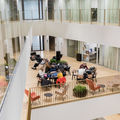
Accessible Aalto Network (AccaNet) (external link)
Accessible Aalto Network (AccANet) is for collaboration and knowledge building to improve our main processes and quality at Aalto University. AccANet members are volunteers who have agreed with their directors to promote accessibility in schools and units. Network members serve as human nodes for different kinds of accessibility issues met in our daily activities. In addition, AccaNet updates the tri-annual Aalto University implementation plan for accessibility with the help of their peers.

- Page 12: "Saavutettavuuden ja yhdenvertaisuuden perusteet otetaan huomioon opettajien ja muun henkilöstön työssä, toiminnassa ja osaamisen kehittämisessä. Aalto-yliopiston korkeakoulut vastaavat saavutettavuusasioiden sisällyttämisestä opiskelijoiden opintojen aloitukseen ja ohjaukseen."
- Page 17: "Aalto-yliopiston tavoitteena on tarjota kaikille yhdenvertainen, tasa-arvoinen ja saavutettava toimintaympäristö, jossa eri tehtävissä olevia sekä erilaisen taustan omaavia työntekijöitä ja opiskelijoita kohdellaan tasapuolisesti ja joka mahdollistaa yhdenvertaisen osallistumisen yliopiston toimintaan."
Link to official document "Aalto University Accessibility Implementation Plan for 2019–2021 (President’s decision)"The general implementation and possible forms of individual support (subsections 1.1 and 1.2) target primarily the built environment, services, the learning and the work environments, teaching arrangements, learning situations and community interaction. The guiding principle is to realise a non-discriminatory, equal and enabling environment for everyone in the Aalto community. Aalto University’s Senior Advisor in Accessibility and the Acca network for collaborationprovides advice and support as well as training and consultation to staff and students in all matters relating to the implementation plan. The implementation will be carried out cost-effectively by:
- a) developing the service culture as well as staff competencies,
- b) defining projects in detail from the perspective of equal participation, and
- c) taking accessibility into account in competitive bidding.
Accessible Aalto
Aalto University strives towards being an accessible, safe and healthy university where research, teaching and services are accessible for all.

World report on Disability: Chapter 6, Enabling Environments (external link)
The first ever WHO/World Bank World report on disability reviews evidence about the situation of people with disabilities around the world. Following chapters on understanding disability and measuring disability, the report contains topic-specific chapters on health; assistance and support; enabling environments etc.

1 Research and learning services
Parties responsible: LES, RIS and HRS
The principles of accessibility and equality will be taken into account in the work, activities and competence development of teachers and other staff. Learning Services (LES) provides consultation and training to the university community, encouraging them to take a broad look at the barriers to study and research. In addition to physical and visual barriers, the community learns to identify the learning barriers and hindrances related to different cultures and attitudes, as well as to different ways of learning and methods of teaching. LES is tasked with providing support and training to teaching staff, who will then have at least a good general knowledge of the benefits of blended learning environments and various teaching methods and be able to refer students to the university services they need. The LES teams, in collaboration with various actors from the Aalto schools, take accessibility into consideration in their own activities as a factor that contributes to the wellbeing and study abilities of students.
1.1 Aalto support for students
Forms of support provided by Learning Services to all Aalto degree students:
- Each student draws up a personal study plan (HOPS), which they can update and obtain approval for as often as needed. This is a support measure provided for all students in identical form.
- Each student is designated an advising teacher (professor, lecturer, university teacher or other academic member of staff), with whom they can discuss their studies.
- Students have an opportunity to attend personal advising meetings with a planning officer or coordinator as needed, for instance, to plan exchange studies, credit transfers or other study affairs.
Enhanced support offered by Learning Services:
- opportunity for regular personal advising meetings with a coordinator or planning officer if, for instance, the student is studying at a slower pace than normally recommended.
- recommendations for individual study arrangements on the basis of an expert opinion
- support for teachers in implementing individual study arrangements.
- services offered by study and career guidance psychologists
Aalto University has a jointly agreed process and certificate template for individual study arrangements and shared practices for allowing extended exam time (+1 h).
Measures to be taken:
- Individual needs will be considered in the arrangements for student admissions and entrance examinations.
- The personal study plan process will be harmonised and developed in order to offer students optimal support.
- In the schools, each new student will be assigned an advising teacher who becomes acquainted with the student’s situation and different ways of learning as well as the opportunities afforded by Aalto University’s blended learning environments to support learning.
- LES will continue to maintain a databank of the various needs of those requiring individual study arrangements. The material provides students, student counsellors and advisors and the LES staff with advice on encountering and supporting students who need individual arrangements. (Cf. 4.3)
- Aalto’s pedagogical experts will be trained in the individual study arrangements process and the support material available in the databank so that they will be able to share the information through teachers’ pedagogical training and thus increase teachers’ awareness and competence in this matter.
- The schools and LES will be in charge of incorporating accessibility matters into the students’ orientation sessions, guidance and tutoring.
- The process for individual study arrangements will be harmonised and developed so as to enable fluent studying atall Aalto schools.
- LES will provide teachers and advisors with the necessary training to advise students during the 2019–21 academic years.
- Starting Point of Wellbeing pilot in 2018–20: advising without appointment booking (FSHS, university chaplains, study psychologists’ service, study advisors, AYY, UniSport)
1.2 Support from external partners
The support provided by external partners to students may take various forms such as:
- interpreter services (speech, speech-to-text, audio description and sign language)
- personal assistants
- guide and assistance dogs
Measures to be taken:
- We will ensure that interpreters and personal assistants have the possibility to conduct their work smoothly in the teaching and research facilities.
- As necessary, training can be offered on using service dogs on campus.
Monitor the accessibility of research and learning services
Learning Services
Aalto University Learning Services (LES) is responsible for all services which facilitate the smooth progression of studies at the university.
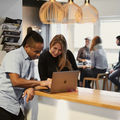
Academic advising
Academic advising is a part of advising system that covers the whole study path of the student. Attending academic advising is a part of studies.

Aalto study and career counselling psychologists
The Aalto University study psychologists work in the Student Services, while a career counselling psychologist is available at the Career Design Lab.

Starting Point of Wellbeing
The Starting Point of Wellbeing offers students easy access to counselling and advice on matters of well-being and study ability. The services available to you include drop-in (no reservation) advising/counselling sessions, peer support groups, and online materials. You can also make an appointment to receive individual counselling.

2 Accessibility of infrastructure
Parties responsible: CAS/ACRE (2.1) and ITS (2.2)
2.1 Barrier-free study and research facilities and work spaces
Achieving a built environment that is barrier-free is an objective of the Aalto strategy. When shortcomings or barriers are noted on campus facilities or routes, the situation is rectified using special arrangements when needed. ACRE (Aalto University Campus & Real Estate) is responsible for charting the barriers of the university’s built environment and planning and executing their removal. Particular weight is put on how diverse users of the campus experience the campus as a safe work and study environment. In addition to the requirements of the Building Code of Finland Aalto strives to adhere to the following principles:
- Good acoustics: this serves everyone —especially hearing or visually impaired persons and persons who do not speak Finnish.
- The colour scheme and materialworld of the buildings support prompt and safe indoor navigation by diverse users.
- Sufficiently large and clear fonts, which are consistent with the ACRE signage manual, are used in the signs, and general information is formatted for prompt perception of the layout of spaces and operations.
- Service design is included in the planning processes as needed.
- Reserving enough storage space for student and staff equipment and work so that the defined access ways and emergency exit routes are barrier-free at all times.
- Ramps, if they fit in naturally with other planning, are used in addition to lifts in elevation differences between building levels.
- Assisting personnel, devices, transportation and other services are smoothly combined with a building’s own functionsand resources (speech-to-text and sign-language interpreters, personal assistants, guide and assistance dogs).
- Hearing, seeing and mobility devices (various microphone systems, special computers, mobile assistive devices and applications, wheelchairs etc.) are used according to the BYOD (‘bring your own device’) principle.
Measures to be taken:
- Accessibility inspections will be included in the campus planning and development process.
- New buildings will be designed to be barrier-free.
- Accessibility inspections will be carried out by external experts when buildings are renovated and outdoor areas designed.
- Workable assisted commuter traffic (wheelchair accessible taxis etc.) will be planned for new buildings and renovation sites.
- To enhance safety, emergency instructions must be made available in multiple languages (University Language Guidelines) and emergency plans must be kept up-to-date.
- We will ensure annually that bicycle parking or similar activities near the entrances do not obstruct any routes.
- Delivery vehicles will be directed to entrances in a manner that does not to obstruct assisted or other commuter traffic.
- It will be ensured that barrier-free and accessible routes are maintained in working order throughout the year and any maintenance is done without delay.
- It will be ensured that power sockets are easy to use, suitable and sufficiently available for various devices.
- We will start planning accessible routes to Dipoli, and implement them gradually in the coming years.
- The accessibility information on the buildings used by Aalto are communicated with the help of the service map
2.2 Accessibility of information systems in university facilities
Advance planning of teaching and meetings lightens the workload of staff during actual events. Therefore, university’s space booking systemis developed to improve the accessibility of the teaching and research environment. Persons booking facilities should have the opportunity to assess how barrier-free a facility is when booking it. To this end, the booking system will be complemented with information on the bookable space’s size in square meters, accessibility and floor plan and furniture. Other information systems to be developed and integrated include MyCourses, Oodi, the contract management system, the accounting system, the student information system, the research information system and the HR information system.
Measures to be taken:
- The possibilities will be looked into for upgrading the system with an option whereby all users of facilities may give feedback and thus ensure the accessibility of the facility in a cost-effective way.
- IT Services will collect data on the utilisation rates for all IT classrooms, and the data will be used to support decision-making.
- Accessibility viewpoints will be taken to consideration in the interfaces of the visual aids used in presentations.
Monitor the accessibility of the university infrastructure
Servicemap (external link)
All the services in the metropolitan area within your reach. Search for services, units or addresses, including Aalto University premises at Otaniemi
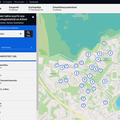
Digital Aalto
Digital Aalto is a university-level strategic initiative that helps us shape a sustainable future.

Aalto-University mapped the quality of induction loops to provide better services to people with hearing loss
The project promotes the equality of people with hearing loss, and it has been significant in scale both in Finland and internationally.
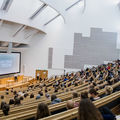
3 Accessible online information systems
Parties responsible: ITS and LES
The EU Directive on the Accessibility of the Websites and Mobile Applications of Public Sector Bodies (‘the Web Accessibility Directive’) and the compliant national legislation require authorities to make digital services accessible. The Finnish Parliament adopted the Act on Provision of Digital Services on 12 February 2019 (306/2019) and the act on amending the Act on Electronic Services and Communication in the Public Sector (307/2019). Both acts entered into force on 1 April 2019. The accessibility obligations will be put into action gradually as of 23 September 2019.
Aalto University’s information network provides staff and students with opportunities for secure and reliable collaboration. Members of the Aalto community have the opportunity to use such accessible devices and programs in their studying and research as best meet their needs (the BYOD principle). ITS ensures that websites are compliant with the EU Web Accessibility Directive (i.e. the AA level of the Web Accessibility Initiative WAI, https://www.w3.org/WAI/) of the World Wide Web Consortium (W3C)). In a key position are those who use of web tools, e.g. the content producers of websites, who are required to have a good command of and compliance with the WAI initiative and the Stivi (http://www.esok.fi/stivi) recommendations. The introduction of new web-tool software is carried out on the scale and timetable that university resources permit as a part of the overall development of ITS.
Measures to be taken:
- Publishing an Accessibility Statement in September 2019.
- Continuing with the accessibility survey of university IT systems and carrying out an assessment of the needs for changing current pages and establishing projects to implement the changes.
- ITS will offer technical support in using the tool software.
- ITS will ensure accessibility in the development and acquisition of information systems and network communications.
- ITS will distribute information on accessible web publishing and on related training to content producers from the schools and departments.
- ITS will ensure sufficient resources to ensure the accessibility of information systems and guidance on barrier-free workstations.
Monitor accessible online information systems
Digital Accessibility
This site provides tools, instructions, and links to promote digital accessibility. The aim of the site is to raise awareness of inclusion and equality and to support a cultural change in publishing across all Aalto units: digital accessibility should be integrated into everyday work.

Drupal: Aalto.fi website
Here, you can find instructions on how to make the most out of aalto.fi to visualise your pages and make your content findable. This page is also for the latest Drupal news and events.
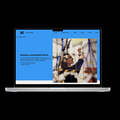
IT services
At Aalto University IT Services, we oversee the entire lifecycle of IT solutions, infrastructure and related operations management, as well as end-user services and user experience. We are responsible for planning and implementing digital transformation together with our internal and external partners and support the University's goal to be a pioneer in digitalisation in learning, teaching and research.
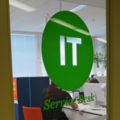
4 Network materials and publication in teaching and research
Parties responsible: LES, RIS and ITS
Applying the principle of open access as widely as possible as part of Aalto’s strategic objective of sharing teaching and study materials openly. Usability and accessibility is ensured in the development of virtual learning environments.
4.1 Online study materials for the Aalto University bachelor’s and master’s degrees
Measures to be taken:
- In cooperation with departmental teachers, LES will train teaching staff on the open access publishing of study materials.
- Teachers can publish degree programmes’ course materials in the open-access study-material portal.
- Supported by the ITS audio-visual team, Aalto members may arrange for network broadcasts of events such as guest lectures and seminars.
- ITS will ensure that a list of approved publishing platforms and their support services is available on the new Aalto website.
- The audio-visual team will provide instructions on how to add subtitling to video recordings. Subtitling complies with the requirements of the Web Accessibility Directive.
- With LES and RIS support, the owners of the materials may define what access rights and copyrights are needed for their materials, in accordance with Creative Commons licensing principles, for instance.
4.2 Aalto University scientific publications
Measures to be taken:
- The research publications and works in the Aalto University publication series will be published primarily through open access (Decision by president, reg. no. 0/246/00.01.06.06/2014). Any restrictions will be agreed upon separately.
- LES library and information services will train and support students and researchers in practices consistent with Aalto’s Open Access principles and in using the publication archive it maintains.
4.3 Material for teaching and developing accessibility
Material supporting accessible teaching and learning will be collected on the aalto.fi website (cf. 1.1). We will concentrate the cumulative expertise of the community members into a single place that is easy to find and to distribute, thus making searches for accessibility information more effective. The site will publish information on diverse learners and on procedures related to entrance exams, evaluations, examination and teaching arrangements, supporting persons with activity limitations, implementing individual study arrangements, and conducting accessibility assessments of work and study spaces. The material will be expanded and updated as experience and feedback accumulate.
Measures to be taken:
- We will continue to publish teaching materials on accessibility, barrier-free design and equality on the Aalto University websites.
- We will look into opportunities for efficient publishing.
Monitor the accessibility of network materials and publications
Digital services for teaching
The Teacher Services team develops digital services for teaching and learning and provides support for their use. The team is part of the Learning Services.

Aalto publication series
The Aalto University publication series contain works related to university’s research, artistic activities and teaching. Aalto University must be the primary publisher of the work for it to be included in an Aalto publication series.
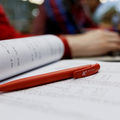
Culture of Open Scholarship
The Culture of Open Scholarship includes responsible researcher and research assessment, services needed for open science and research, and the use of participatory methods.

Research Data Management (RDM) and Open Science
Aalto University offers comprehensive services, guidance, and support to help you manage your data efficiently. Explore our collection of resources and external links to boost your research.
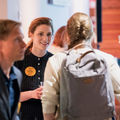
Open Access Publishing
Open access ensures that scientific publications are accessible to everyone free of charge.

Publications and theses (external link)
Our publication archive consists of doctoral, Master's and Bachelor's theses, research articles and seminar reports, among others.

Aalto University Open Science and Research Policy
Open science means open access to scientific publications, research data, methods, software codes, educational resources, and infrastructures. It is a key instrument for increasing the impact of the research conducted at Aalto University.

5 Information and communication
Parties responsible: COS and Aalto schools’ departments
Accessibility is taken into account in the general development of web publishing. Communications Services provides support for communicating to students as well as to staff information on the progress and assessed results of the accessibility implementation plan. In addition, Communications Services supports all persons who publish and update information on the web channels used by the university concerning barrier-free interaction and achieving accessible publishing. New online materials will comply with both the Web Accessibility Directive and the criteria of the W3C/WAI initiative. Different language versions in compliance with the university Language Guidelines as well as the standardisation of document formats and content are taken into account as far as possible and on a needs-based priority. In addition, Communications Services is, when necessary, engaged in prioritising the measures meant to achieve accessibility and a barrier-free environment and also in prioritising the target groups for such measures. The schools will comply with the Web Accessibility Directive and monitor the accessibility of the websites administered by their departments and other units (research groups etc.).
Measures to be taken:
- The quality goal for digital communications will be for Aalto University websites to meet the AA-level criteria of the W3C/WAI initiative.
- All new materials will comply with the EU Web Accessibility Directive as of 23 September 2019.
- Old sites will comply with the Directive as of 23 September 2020 excluding the archived pages.
- The Stivi recommendations will be applied to Aalto’s digital communications guidelines.
Monitor the accessibility of information and communication
Drupal: Aalto.fi website
Here, you can find instructions on how to make the most out of aalto.fi to visualise your pages and make your content findable. This page is also for the latest Drupal news and events.

Digital Accessibility
This site provides tools, instructions, and links to promote digital accessibility. The aim of the site is to raise awareness of inclusion and equality and to support a cultural change in publishing across all Aalto units: digital accessibility should be integrated into everyday work.

Accessibility of files (external link)
Practical instructions (in Finnish) how documents can be made accessible.

6 Competence development
Parties responsible: HRS, COS and LES
Competence development and auxiliary policies for its implementation take into account Aalto’s principles of diversity, internationality andequality. Staff training recognises the importance of attitudes, puts much emphasis on customer service, organisational behaviour, marketing to various kinds of target groups, and the different forms of discrimination. In addition, the Aalto University Equality Committee (EQU), the LES teams and the Accessible Aalto Network for collaboration (AccaNet) brainstorm, plan and develop accessibility training. The adoption of accessibility practices as well as their development and impact monitoring will be incorporated into staff competence development beginning in the 2019–2020 academic year:
- Accessibility is taken into consideration in competence development as a whole and in the practical arrangements for training sessions.
- The university Language Guidelines, multilingualism and international staff is considered in training courses (e.g. by offering courses in basic Finnish, publishing curriculum information in English and conducting various preparatory training courses in English).
- LES concentrates particularly on developing the competencies of teaching staff, while taking into account accessibility issues involving the learning environment.
- HRS focuses on developing competencies that are shared by everyone and takes accessibility into account in its training sessions in practical arrangements, venue choices and training materials.
Measures to be taken:
- The Aalto University Code of Conduct is incorporated into all training.
- Orientations for new employees are accessible and go over what accessibility means at Aalto University.
- LES and HRS disseminate information to Aalto employees and students and their network partners on the ESOK seminar in spring 2019 on the Otaniemi campus and enable community members to take part in the seminar.
- We will organise the annual Aalto Goes Accessible symposium in 2020 and 2021.
- A survey will be conducted by Human Resource Services, Learning Services and Leadership Support Services at Aalto of the existing expertise in different areas of accessibility (e.g. acoustics,usability, barrier-free design, visual design, typography, service design) in order to find suitable trainers within the Aalto community (professors, researchers, study psychologists, visiting researchers etc.).
- The accessibility specialist and expert network will support in competence development.
Monitoring accessibility in competence training
Aalto University pedagogical training for faculty
Are you looking to develop your skills as a teacher? Participate in Aalto's pedagogical training!

Diversity in customer service: Providing Great Customer Experience for All
Join your colleagues online to learn how customer service representatives acknowledge and respect diversity of our community to increase customer satisfaction.

Aalto goes Accessible symposiums (external link)
Annual Aalto goes Accessible symposiums in the beginning of January are for learning, sharing and innovating best practices to promote equality and diversity at Aalto University. We will learn the opportunities offered by the blended learning environments of Aalto University. The goal is to provide faculty and staff with a good general knowledge of the benefits of blended learning environments and teaching methods and to train them in referring the students for the university services they need.

EDI learning hub
Practical tips for fostering equality, diversity and inclusion.

Handbook on diversity in recruitments
This handbook is intended for use throughout Aalto community in supporting us making excellent recruitments that foster both excellence and equality.

Service units and abbreviations (Finnish, English, Abbreviation, Director)
- Tutkimus-ja innovaatiopalvelut, Research and Innovation Services, RIS, Ossi Naukkarinen
- Tekniset palvelut, Technical Support Services, TSS, (coordinated from RIS)
- Kampuspalvelut, Campus Services, CAS, Ville Jokela (ACRE)
- Oppimispalvelut, Learning Services, LES, Petri Suomala
- Viestintäpalvelut, Communications Services, COS, Jaakko Salavuo
- Tietotekniikkapalvelut, IT Services, ITS, Kati Hagros
- Talouspalvelut, Financial Services, FIS, Marianna Bom
- Henkilöstöpalvelut, HR Services, HRS, Riitta Silvennoinen
- Johtamisen tukipalvelut, Leadership Support Services, LSS, Sirkku Linna






